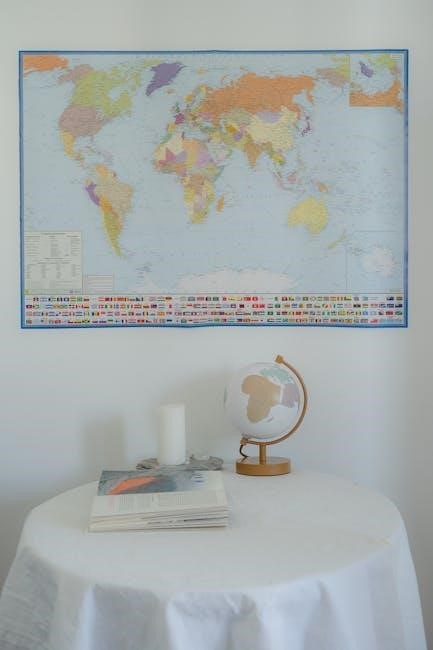
The Great Books of the Western World is a 54-volume series curated by Robert Hutchins and Mortimer Adler, featuring seminal works from Western civilization.
Overview of the Series
The Great Books of the Western World series, published in 1952 by Encyclopædia Britannica, presents 54 volumes of influential works from Western civilization, spanning from ancient Greek writings to modern thinkers like Freud. Designed for a broad audience, the series includes a 10-year reading plan to guide exploration of these seminal texts. The second edition expanded the collection, incorporating 20th-century authors. Organized chronologically and thematically, the series covers literature, philosophy, and science, offering readers a comprehensive engagement with Western intellectual heritage.
Historical Context and Significance
The Great Books of the Western World emerged in the mid-20th century as a response to the decline of classical education and the fragmentation of modern academia. Conceived by Mortimer Adler and Robert Hutchins, the series was a democratic effort to make Western civilization’s foundational texts accessible to the general public. Published in 1952, it aimed to preserve and promote the intellectual heritage of the West, fostering critical thinking and cultural literacy. This initiative reflected a broader movement to reintegrate liberal arts education into everyday life, ensuring that timeless ideas remained relevant in contemporary society.

The History and Development of the Series
The Great Books of the Western World was first published in 1952 by Encyclopædia Britannica, featuring 54 volumes of seminal works from Western civilization. Over time, it evolved.
Publication and Evolution Over Time
The Great Books of the Western World was first published in 1952 by Encyclopædia Britannica, Inc., as a 54-volume set. A second edition followed in 1990-1991, expanding to 60 volumes and including works from the 20th century. Mortimer Adler played a key role in its development, aiming to democratize access to classical knowledge. The series has since been digitized, with PDF versions available online, making it more accessible to modern readers. This evolution reflects its enduring relevance and adaptability in preserving Western intellectual heritage.
Key Figures: Robert Hutchins and Mortimer Adler
Robert Hutchins and Mortimer Adler were pivotal in shaping the Great Books of the Western World. Hutchins, as President of the University of Chicago, championed liberal arts education, while Adler, a philosopher, advocated for accessible learning. Together, they curated the series to include works they deemed essential for understanding Western civilization. Adler’s belief in the “great conversation” of ideas influenced the selection, making these texts available to a broad audience. Their collaboration ensured the series’ academic rigor and accessibility, leaving a lasting impact on education and cultural literacy.

Selection Criteria for Inclusion
The series included works deemed relevant to contemporary matters and representative of Western civilization, spanning 54 volumes of influential texts that shaped Western thought and culture.
Relevance to Contemporary Matters
The Great Books of the Western World remain highly relevant today, addressing timeless questions about human nature, ethics, and society. Despite being published decades ago, the texts continue to influence modern thought, offering insights into democracy, science, and philosophy. Their digital availability in PDF and online libraries ensures accessibility for contemporary readers. These works not only reflect the past but also provide a foundation for understanding current issues, making them indispensable for anyone seeking to engage with the intellectual heritage of Western civilization in the 21st century.
Representation of Western Civilization
The series encapsulates the intellectual and cultural journey of Western civilization, spanning from ancient Greek philosophy to modern 20th-century thought. It includes works by influential figures like Plato, Shakespeare, and Nietzsche, providing a comprehensive overview of the development of literature, philosophy, and science. The curated selection reflects the evolution of ideas that have shaped Western identity, making it a cornerstone for understanding the civilization’s heritage. The PDF versions and digital accessibility ensure this legacy remains accessible for future generations to explore and learn from.

Structure and Organization of the Series
The series is chronologically and thematically organized, covering major fields like literature, philosophy, and science, to provide a cohesive exploration of Western thought and knowledge.
Chronological and Thematic Arrangement
The series is organized chronologically, spanning from ancient works like Homer’s Iliad to modern authors, ensuring a logical flow of ideas through time. Thematically, it groups works by key concepts, such as justice or beauty, allowing readers to explore how thinkers across centuries engaged with similar questions. This dual approach enables a deeper understanding of intellectual evolution and interconnectedness, fostering a rich engagement with Western civilization’s foundational ideas.
Coverage of Major Fields: Literature, Philosophy, Science
The series comprehensively covers literature, philosophy, and science, showcasing works by influential figures like Shakespeare, Plato, and Newton. Literature includes masterpieces from Homer to modern authors, while philosophy spans from ancient Greeks to contemporary thinkers. Science is represented by foundational texts in physics, mathematics, and biology, highlighting pivotal discoveries. This breadth ensures readers gain a well-rounded understanding of Western intellectual development across disciplines, fostering a holistic appreciation of humanity’s greatest achievements.

Mortimer Adler’s Vision and Contribution
Mortimer Adler championed the democratization of knowledge through the Great Books of the Western World, believing classical texts could transform individuals and society. His syntopical approach emphasized thematic reading across centuries, fostering a “great conversation” among thinkers.
The Concept of the “Great Conversation”
Mortimer Adler’s “Great Conversation” refers to the continuous dialogue between Western thinkers across millennia, where authors reference and build upon earlier works. This intellectual exchange creates a cohesive narrative, inviting readers to engage with timeless ideas. By reading these texts, individuals join a conversation that spans centuries, fostering a deeper understanding of Western civilization’s evolution. Adler believed this dialogue was essential for cultivating informed citizens and enriching personal growth.
The 10-Year Reading Plan and Syntopical Approach
Mortimer Adler’s 10-Year Reading Plan offers a structured approach to exploring the Great Books, organized by themes rather than chronology. This syntopical method groups works around universal topics like justice, beauty, and freedom. Readers engage with diverse perspectives across eras, fostering a holistic understanding. Adler designed this plan to be accessible, encouraging readers to delve systematically into profound ideas. The approach emphasizes discussion and reflection, making complex texts manageable and enriching for lifelong learning.

Impact on Education and Cultural Literacy
The Great Books series has profoundly influenced education, promoting a liberal arts approach and fostering cultural literacy by making classical works accessible to a broad audience.
Democratization of Knowledge
Mortimer Adler envisioned the Great Books as a tool for democratizing knowledge, making classical works accessible to everyone. The 54-volume set, published by Encyclopædia Britannica, aimed to bridge the gap between academic elites and the general public. By compiling essential texts from Western civilization, Adler sought to empower individuals with the tools of critical thinking and cultural literacy. This initiative revolutionized education, enabling people from all backgrounds to engage with foundational ideas. The series’ widespread availability, including digital versions in PDF format, continues to embody Adler’s mission of universal access to knowledge.

Influence on Liberal Arts Education

The Great Books of the Western World profoundly influenced liberal arts education by emphasizing the study of foundational texts. This approach, championed by Mortimer Adler, encouraged a curriculum centered on classic works rather than specialized disciplines. The series promoted critical thinking, interdisciplinary connections, and a deep understanding of cultural heritage. Many liberal arts colleges adopted this model, fostering a holistic educational experience. Today, the availability of these texts in PDF and online formats ensures continued accessibility, preserving their impact on modern liberal arts curricula.

Modern Access and Digital Availability
PDF versions of the Great Books of the Western World are now widely accessible online, enabling easy reading and study through digital platforms and libraries.
PDF Versions and Online Libraries
The Great Books of the Western World are now accessible in PDF formats, enabling readers to explore these seminal works digitally. Online libraries like Z-Library and Library Genesis offer comprehensive collections, providing easy access to all 54 volumes. These digital versions are particularly useful for modern readers, allowing for convenient searching, highlighting, and annotation. Additionally, online communities and forums dedicated to these texts foster discussion and shared learning. This digital availability has democratized access to these foundational works, ensuring their relevance in the modern era.
- Shadow libraries provide free access to PDFs.
- Digital platforms enhance readability and engagement.
- Online communities support collaborative study.
- Online forums facilitate global discussions.
- Structured programs aid systematic study.
- Modern platforms ensure continued relevance.
Contemporary Reading Communities and Resources
Modern enthusiasts of the Great Books have established vibrant online communities, such as Online Great Books, fostering dialogue and shared exploration of these texts. These platforms offer structured reading plans, discussion forums, and resources to guide readers through the series. Initiatives like Scott Hambrick’s program provide accessible frameworks for engaging with these works, making them relevant to contemporary audiences. Such communities not only preserve the legacy of the Great Books but also introduce them to new generations, ensuring their enduring impact.